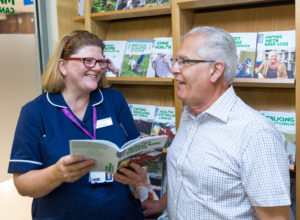Bladder Cancer
On this page:

Bladder cancer is the 7th commonest cancer in the UK with 10,000 new diagnoses and 5,000 deaths from bladder cancer every year. Bladder cancer is usually identified during investigations for blood in the urine (haematuria) and is treatable in the majority of the cases.
What are the tests and treatments?
We run one-stop rapid access haematuria clinics weekly where patients can have an ultrasound examination of the urinary tracts and a flexible cystoscopy (bladder inspection with a thin flexible telescope) on the same day.
Patients with invasive bladder cancer or recurrent non-muscle invasive bladder cancer may be offered radical cystectomy. This is performed using the da Vinci® robotic system which forms the next step from keyhole surgery (laparoscopic surgery). The system allows the surgeon to use miniaturised instruments through small incisions to remove the bladder and surrounding tissue – the technique allows for quicker recovery and reduced pain following the operation.
We offer the following investigations and treatments for bladder cancer:
- Cystoscopy (including Narrow Band Imaging (NBI))
- Transurethral resection of bladder tumour delivered by consultants with interest in bladder cancer
- Intravesical chemotherapy/immunotherapy (bladder instillation with Mitomycin C or BCG)
- Hyperthemic Chemotherapy service which is the largest and the most established service in the UK to treat high risk bladder cancer which has not breached to the bladder muscle but is resistant to standard therapies.
What is Personalised Cancer Care?
Personalised Cancer Care means your team will support you to take an active role in your cancer care by giving choices and control based on what matters most.
Together with your key workers’ team, like your Clinical Nurse Specialist and Macmillan Support worker, we will aim to help you access the care and support that meets your individual needs from the moment you receive your cancer diagnosis so that you can live as full, healthy and active a life as possible.
You will be invited to complete a Holistic Needs Assessment (HNA) to identify any concerns you may have when you have been diagnosed with cancer. These concerns may be physical, emotional, practical, financial and spiritual.
You will answer a simple set of questions or fill in a checklist about all areas of your life. It is to find out about the concerns you may have. You are often asked to rate how important these concerns are to you. It could help you decide what to discuss first during the assessment.
Once you have completed the assessment, your Clinical Nurse Specialist will discuss your needs, maybe face-to-face in a clinic or over the phone. During the discussion, you and your Clinical Nurse Specialist will agree on the best ways to manage your needs and concerns. They will write down what you have decided in a document called a care plan. They may write it during the discussion. Or they may make notes and send them to you afterwards. Your care plan will record the following:
- The main concerns you talked about
- Suggestions and actions to help you manage your concerns
- Services that may be able to support you, and any referrals that are made
- What is already being done to help – for example, the services you are already using
- Information about who to contact if you need more help
- The details of other health or social care professionals with whom you have agreed to share the information.
You may not wish to complete the holistic needs assessment at this time. The care you receive will not be affected in any way, and we will be happy to discuss this again in the future
Health and wellbeing information and support also include:
- Access to the Macmillan Information & Support Centre to find out what support is available in the community, e.g., practical, financial, and how to access it
- Help with understanding cancer and its treatment and how to manage its impact through videos and workshops run by healthcare professionals at St George’s and in the community.
- Attend wellbeing activities which are great opportunities for you and your carers to get together with others affected by cancer.

